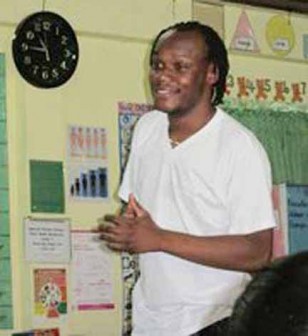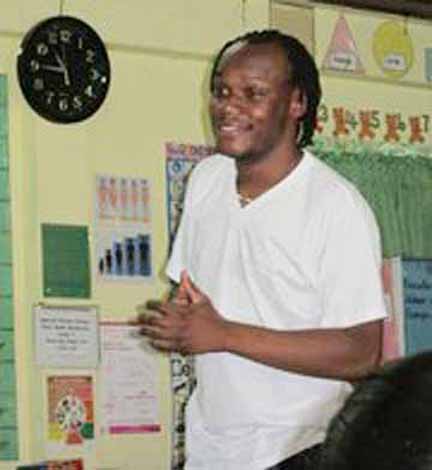Deaf children across Guyana are now being given the chance to express themselves through drama, and they are currently being taught by a deaf drama student from the United States, who is doing an internship here.
Twenty-four-year-old Daniel Ilaire is a deaf drama student from Gallaudet University in Washington DC, and he took time out from his busy schedule working with children in different parts of Guyana, to have a chat with The Scene.
Daniel was born in Boston, Massachusetts. Not only is this talented individual a student, but he has also visited Canada and Europe teaching what he has learnt.
 The multitalented Daniel is in Guyana for ten weeks – from June 7 – teaching and interacting with children from the different special schools across the regions.
The multitalented Daniel is in Guyana for ten weeks – from June 7 – teaching and interacting with children from the different special schools across the regions.
Communicating with us through his interpreter Quincy Richards, Secretary of the Deaf in Guyana, Daniel shared that what prompted him to do drama, more so teach it to children was his love for the art, “I like drama and I like to teach children and people who do not necessarily know sign [language]”.
Not only is Daniel interacting with deaf children, but also those without hearing impediments, and these he said informed him “that they like for me to teach them, as opposed to hearing people teaching them because deaf people dramatize a lot”.
So, how does he go about teaching drama to children who are impaired? Daniel says he first gets a feel of what they’re about and then uses that to teach them. For example, he said, he tries to use creative drama, so based on their abilities and skills, that’s how the different messages can be portrayed.
He revealed that the children’s finished product will be performed before a live audience. Additionally, the skills they would have garnered will give them the opportunity to perform on television some time in the near future. “Whatever they can do, that’s what they’ll be portraying,” he signalled. One of the genres that will be performed by the children is Looney Tunes, which Daniel says they love.
When asked his impression on the deaf community in Guyana, the budding teacher signalled that “they’re very interested in drama, have really good dreams, and they are very motivated.” He explained that they do not have a lot of exposure, [so] “with the little that we do, they are very enthusiastic about it”.
Given the differences in the signs used in sign language, Daniel was asked how he goes about communicating with the children. To this he replied, “Before, I’ve worked with hearing kids and they didn’t know signs very well, so I used my voice [with which he is well able to pronounce some words], body language, and facial expression for them to understand. I think that communication is slow with deaf people in Guyana; I don’t think they’re very fluent in signs, but bit by bit I think we’ll eventually get there, as they’re very excited.”
Asked who stood to benefit from the successful outcome of this initiative, Daniel signalled, “though the university will benefit for the most part, I too will feel happy in the end, as I am learning how to practice my teaching and learning how to reciprocate communication back and forth”. He also added that what he teaches these children can be used in the future.
And, does he plan on using drama professionally? “Well,” he signalled, “when I’m done studying at Gallaudet, I want to go on to another college to study for my Masters in Fine Arts. After that I can better be able to travel the world, teaching deaf and hearing people.”
President of the Deaf in Guyana Sabine McIntosh told The Scene that what prompted her to start the movement was the fact of her granddaughter being deaf. According to Sabine, the group began in 2008, “a group of us got together and formed it. The main idea was to promote the visual in performing arts”. This she feels is a natural way to strengthen the deaf community and to enable them to interact with the hearing community. “It allows them to better express themselves,” she added. Apart from conducting workshops, which serve as a means of interacting with and observing deaf persons in various communities across Guyana, Sabine says the organization has also been putting on public shows at the Theatre Guild every year since 2009, when it had its first performance titled ‘Talking Hands Dancing Feet’; a name which has been repeatedly used over the years. She added that last year the group started a show called ‘Deaf Got Talent’, and this year Part Two of the same is slated for August 6. This is why the association approached the administration at Gallaudet University, and asked for assistance in developing the drama skills in the deaf community, so that they will be able to put on “a more fantastic show than last year,” she said.
The president disclosed that they are currently working together with groups and schools, discussing how best they can use their performances in existing events; Linden Town Week being one of them. There will soon be street performances by the children, and Sabine revealed that soon video clips of the performances will be in the making for educational purposes. The latest idea, she added, is a Deaf Theatre for Children, in which children will be able to perform mimes, fairytales, and so on.
According to Quincey, “deaf people are very much a part of society, so when there are events and television programs being aired, there needs to be systems put in place to accommodate them. For example, the TV shows should have interpreters to go with the programmes,” so that deaf persons can be a part of and enjoy them as well.
Sabine and Quincey agree that there are three main issues plaguing the deaf community, the first one being that of the language barrier; “the language of the deaf is the visual language [sign language] and that of the hearing community is the spoken,” they say. What Sabine has observed is that many persons do not know sign language nor is there much respect for it, “although it has piqued the interest of persons recently […] Sign language has its own uniqueness; it has its own vocabulary, its own grammar, and a lot of people don’t understand this so they take it for granted”.
Another issue they cited is that of teachers not being properly equipped to teach deaf children in schools. What they said needs to be done is for teachers in training at the Cyril Potter Training College to be taught sign language, and this will help them to be better equipped to interact as well as teach deaf children, and this will in turn help somewhat in breaking down the language barrier. As such, Sabine foretold, “there’s a long way to go in getting equal opportunity for deaf children”.
The final issue identified by the President and Secretary was that of stigma which they said is manifested not only in strangers and the hearing community, but by the parents of deaf children as well. “People attach a stigma to deaf people […] even parents think that something is wrong with their child, and as such oftentimes they tend to place the child in the background/dark, thinking that that child is incapable of doing or amounting to much. Their expectations are low, and they need to raise their expectations,” Sabine stated.
Though the association began with drama as its main aim, there are also other programmes being developed such as sports [athletics, cricket, football], education Signing B Competitions; similar to the Spelling B Competitions], and a manual, which is sign language based, has been developed for health professionals.









